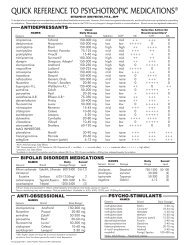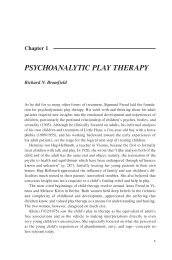IRAQ WAR CLINICIAN GUIDE
Iraq War Clinician's Guide - Network Of Care
Iraq War Clinician's Guide - Network Of Care
Create successful ePaper yourself
Turn your PDF publications into a flip-book with our unique Google optimized e-Paper software.
Iraq War Clinician Guide 75 Traumatic Grief<br />
XI. Traumatic Grief: <br />
Symptomatology and Treatment in the lraq War Veteran <br />
Ilona Pivar. Ph.D<br />
Symptoms of Grief are Distinct from PTSD and Depression<br />
Although research into the prevalence and intensity of grief symptoms in war veterans is limited,<br />
clinicians recognize the importance for veterans of grieving the loss of comrades. Grief symptoms<br />
can include sadness, longing, missing the deceased, non-acceptance of the death, feeling the<br />
death was unfair, anger, feeling stunned, dazed, or shocked, emptiness, preoccupation with<br />
thoughts and images of the deceased, loss of enjoyment, difficulties in trusting others, social<br />
impairments, and guilt concerning the circumstances of the death. Recent research results,<br />
although limited to one sample of Vietnam combat veterans in a residential rehabilitation unit for<br />
PTSO, have supported findings in the general bereavement literature that unresolved grief can be<br />
detected as a distress syndrome distinct from depression and anxiety. In this sample of combat<br />
veterans, grief symptoms were detected at very high levels of intensity, thirty years post-loss. The<br />
intensity of symptoms experienced after thirty years was similar to that reported in community<br />
samples of grieving spouses and parents at six months post-loss. This supports clinical observations<br />
that unresolved grief, if left untreated, can continue unabated and increases the distress load of<br />
veterans. The existence of a distinct and intense set of grief symptoms indicates the need for<br />
clinical attention to grief in the treatment plan.<br />
Attachment and Bonding of Soldiers are Essential to Unit Cohesiveness<br />
Bonds with unit members are described by many veterans as some of the closest relationships they<br />
have formed in their lives. During Vietnam, soldiers were rotated in and out of units on individual<br />
schedules. Nevertheless, the percentage of returning veterans with PTSD who also report<br />
bereavement-related distress is high. In the lraq conflict, young soldiers and reservists have<br />
remained with their units throughout training and deployment. Levels of mutual trust and respect,<br />
unit cohesiveness, and affective bonding will have been further strengthened by the experiences of<br />
deployment. While bonding and attachment to the unit may result in some protection against<br />
subsequent development of PTSD, unresolved bereavement may be expected to be associated<br />
with increased distress over the life span unless these losses are acknowledged and grief symptoms<br />
treated on a timely basis.<br />
Traumatic Grief<br />
Traumatic grief refers to the experience of the sudden loss of a significant and close attachment.<br />
Having a close buddy, identification with soldiers in the unit, and experiencing multiple losses<br />
were the strongest predictors of grief symptoms in the above sample of Vietnam veterans. Other<br />
factors that may influence the development of prolonged grief syndrome include: survivor guilt;<br />
feelings of powerlessness in not being able to prevent the death; anger at others who are thought<br />
to have caused the death; anger at oneself for committing a self-perceived error resulting in the<br />
death; tasks of survival in combat taking precedence over grieving; not being able to show<br />
emotional vulnerability; numbing and defending against overwhelming emotions; not having an<br />
opportunity in the field to acknowledge the death; and increased sense of vulnerability by seeing<br />
DEPARTMENT OF VETERANS AFFAIRS<br />
NATIONAL CENTER FOR PTSD




